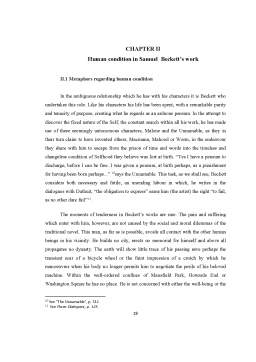Cuprins
- INTRODUCTION 1
- CHAPTER I
- Samuel Beckett’s novels 5
- I.1 Beckett’s early novels and poems 5
- I.2 Beckett’s “most wanted” novels 6
- I.3 Beckett on stage 9
- I.4 Transitional objects and the isolate: “Malone Dies” 13
- CHAPTER II
- Human condition in Samuel Beckett’s work 19
- II.1 Metaphors regarding human condition 19
- II.2 “THE FAILURE” in Beckett’s novels 27
- II.3 Beckett’s fiction 31
- II.4 Beckett’s figurative language 35
- CHAPTER IV
- Infinite pessimism 43
- IV.1 Time, Space, and Movement in Beckett's Work 43
- CONCLUSION 45
Extras din licență
INTRODUCTION
The problem of seeing in an indeterminate world has long preoccupied Samuel Beckett. In his works, human beings no longer occupy a stable and privileged point in space and time from which they may visually organize, give meaning to, and institute relationships with other beings and objects. Instead, they find themselves drifting in and out of vague, undefined fields of vision in which the objects of their gaze appear, disintegrate, combine, separate, approach, and fade away in unpredictable fashion. The subjects themselves are victims of the same instability, and they call their own existence and its form into question at least as often as they interrogate the world around them. Indeed, the very boundary between the self and the world is an object of much confusion and speculation. In a 1934 essay entitled " Recent Irish Poetry," Beckett distinguished between the "antiquarians" and those who "evince awareness of the new thing that has happened, or the old thing that has happened again, namely the breakdown of the object," which he equates with "the breakdown of the subject," asserting that "it comes to the same thing—rupture of the lines of communication." He claims that "the artist who is aware of this may state the space that intervenes between him and the world of objects.... He may even record his findings, if he is a man of great personal courage."
By his own admission, Beckett is not a philosopher; his ideas may be (and have been) traced to numerous sources from Democritus of Abdera through Saint Augustine, Descartes, Geulincx, Pascal, Berkeley, Hegel, Schopenhauer, Husserl, Wittgenstein, Heidegger, and Sartre. He is rather an artist— a writer sensitive to the specificity of his time and capable of translating it into literary and dramatic forms that affect his audience by their ring of truth and by their ability to translate for a collectivity what each of us has felt or suspected vaguely, intuitively, disturbingly. Beckett has defined the mission of the modern artist in the following terms: "To find a form that accommodates the mess, that is the task of the artist now."
Beckett has shown his special ideas and concern with human impotence and miserable condition in this world. Samuel Beckett's writing has always posed stubborn problems for literary critics and historians. His astonishing inventiveness and the bizarre nature of his inventions; the mingling of anguish and elegance-talking of first and last things through the masks of clownish vagabonds-have made his work uncommonly difficult to describe and evaluate; and his movements through countries, languages and genres make a brief, comprehensive account of his career almost impossible to compose.
When he first began to write in English, Beckett published poetry, criticism, short stories and a novel. “Whoroscope” (1930) and the collection of poems “Echo's Bones” (1935) were generally unnoticed, but “Proust” (1931), “More Pricks Than Kicks” (1934) and “Murphy” (1938) were reviewed by well-known (or about to be well-known) critics and poets. As if to predict the future, young Beckett's odd and refractory talent aroused contradictory responses, praise and blame coming from unexpected sources.
Preview document
Conținut arhivă zip
- Reality and Ilussion in Samuel Beckett's Novels
- Copy of Beckett Biblio.doc
- Copy of Beckett Contents.doc
- Reality and Ilussion in Samuel Beckett's Novels.doc


























































